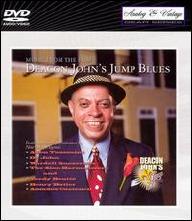Moore later co-founded the Original Echoes in 1957, while still in high school. After his fellow guitar player in the group, Terry Big T de Rouen, moved to California, Moore played in various pickup bands before joining a group called the Ivories along with Roger Lewis of the Dirty Dozen Brass Band. Moore re-formed the group several years later as Deacon John the Ivories, a longstanding group with varying members that Moore continues to lead. Alumni of Deacon John the Ivories include Charles, Cyril, and Art Neville; Smokey Johnson; Zigaboo Modeliste; James Booker; James Rivers; James Black; and Sammy Burfect.
After hearing Moore play guitar and sing at the Dew Drop Inn, pianist, producer, and bandleader Allen Toussaint asked him to play on some recording sessions. Moore began filling in for studio guitarists from the Crescent City when they were on the road, including musicians like Edgar Blanchard, Roy Montrell, and Papoose Nelson. Later in the 1950s and '60s, Moore also began joining Dave Bartholomew, Wardell Quezergue, Harold Batiste, and Red Tyler in the recording studio, recording mostly at Cosimo Matassa's studio. Moore's guitar playing can be heard many R&B hits, including Irma Thomas' Ruler of My Heart, Lee Dorsey's Working in the Coal Mine, Aaron Neville's Tell It Like It Is, Robert Parker's Barefootin', and Ernie K-Doe's Mother-in-Law.
Moore, who was later dubbed "the Creole Chameleon," makes his living in and around New Orleans playing private parties and society dances, as opposed to relying on the Crescent City's still vibrant -- relative to other cities -- club scene. By the mid-'70s, he returned to his roots in classic R&B, and began leading a band with a horn section while playing some slide guitar and teaching blues in the schools throughout Louisiana. Moore has performed at every New Orleans Jazz and Heritage Festival since 1970.
Moore's available releases include Singer of Song, a 1990 release; Live at the New Orleans Jazz and Heritage Festival 1994, a 1999 RedBone release; and most recently, 2003's Deacon John's Jump Blues, a CD, DVD, and documentary film celebrating the glory days of New Orleans R&B and honoring great musicians like Smiley Lewis, Shirley Lee, Professor Longhair, and Johnny Adams, among others. Deacon John's Jump Blues includes contributions from big-band leader, composer, and arranger Wardell Quezergue; piano players Dr. John, Allen Toussaint, Henry Butler, and Davell Crawford; and others. Moore used vintage amplifiers and microphones but contemporary recording techniques to recapture the sound and spirit of classic New Orleans R&B. ~ Richard Skelly, Rovi












